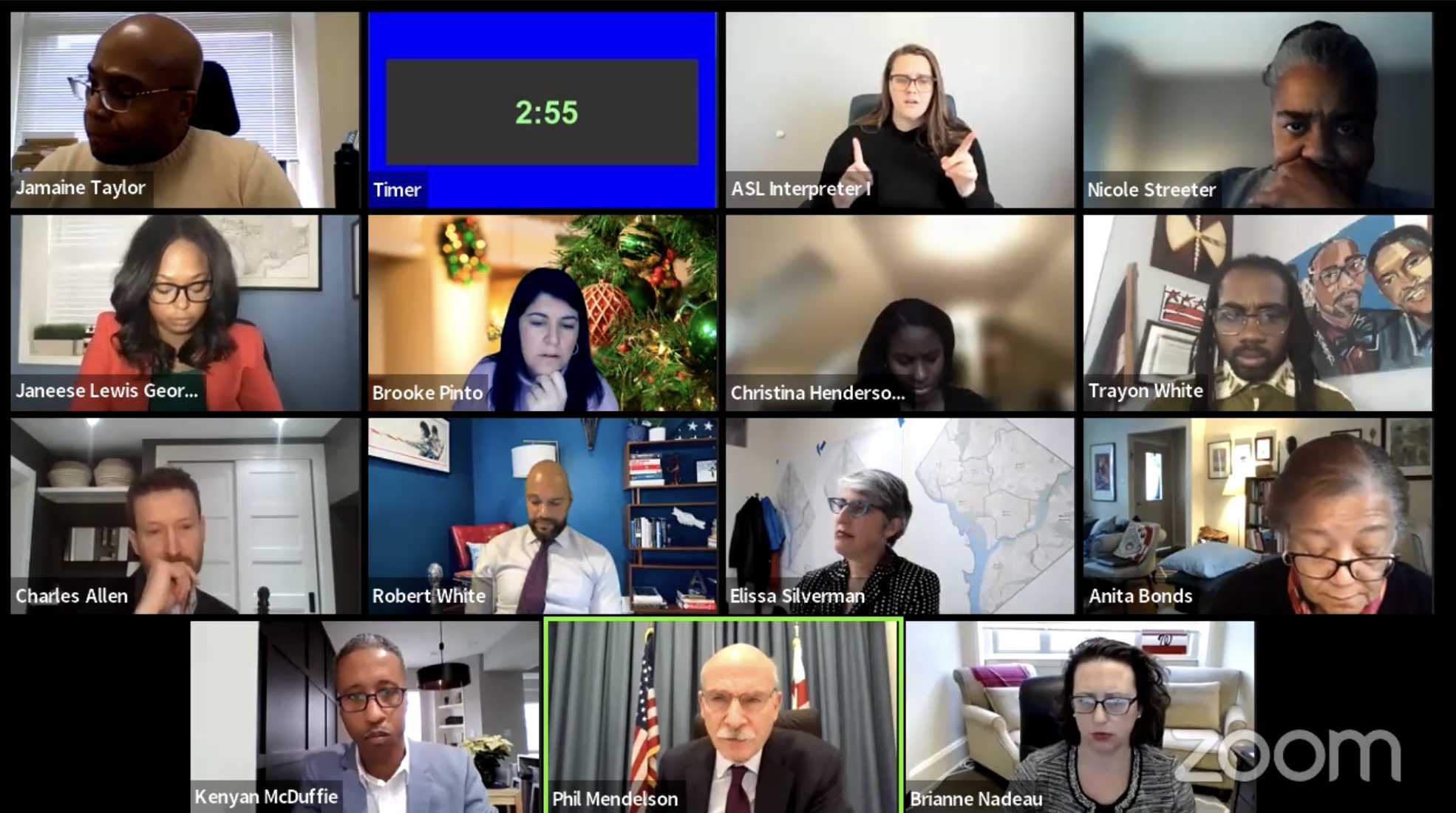Student COVID Vaccine Mandate, Ward Redistricting Receive Final Council Approval

The Council’s last Legislative Meeting of 2021 looked an awful lot like its second-to-last meeting two weeks prior. Given the nature of the Council’s legislative process, with virtually all measures requiring two votes at separate meetings, duplication is to be expected. However, rarely do two meetings so neatly align, agenda-wise, as these two did on their most critical measures.
Given the week’s weighty COVID news, including the skyrocketing case rate, the overdue return of the District’s mask mandate, and the pending broad expansion of self-testing, the Council’s final vote on the student mask mandate could not have come at a better time. As passed, the measure requires all students who are eligible to receive a fully-approved vaccine to be vaccinated by March 1. Enforcement of the measure, as is the case with all previously required vaccines, will counterbalance the need for a vaccinated student body with the necessity to have kids in school every day. Given that the COVID vaccine will be added to the battery of required vaccines mid-year, the enforcement protocol will not kick in for unvaccinated students until the beginning of the 2022-2023 school year.
In addition to the passage of the student COVID mandate, the Council also took other action against the pandemic at the meeting. As part of the mandate bill, the Council also supported a COVID vaccine mandate for all staff at licensed Child Development Facilities, and an electronic vaccine reporting system to be used to share updates on student vaccination status directly with the Department of Health and the relevant local education agency. Via separate legislation, the Council extended the end date for the mayor’s authority to declare COVID a public emergency until March 17 and the sunset date for the Council’s own Special Committee on COVID until March 1. The Council also passed an emergency measure attempting to balance the mayor’s need for emergency COVID procurement authority with the Council’s need for increased oversight to avoid past procurement woes.
Also at its most recent meeting, the Council passed for the second time the ward redistricting measure triggered by the 2020 Census. Other than technical corrections, the main change made to the new ward map in its second vote was to undo the first vote’s proposed shift of the Soldiers’ Home to Ward 1, instead leaving it where it is now, in Ward 5. The bulk of the other changes made to the ward map in the bill passed at the prior meeting, including the shrinking of Ward 6, the growth of Ward 7 further into Capitol Hill, and Ward 8’s stretch across the Anacostia to encompass Navy Yard, were sustained in the second passed version. In addition to the permanent legislation, the bill was also passed on an emergency basis so that the new ward boundaries could go into effect on January 1, 2022. This emergency measure was necessary so that planning for the District’s June and November, 2022 elections can commence immediately.
In another repeat from the prior Legislative Meeting, there was again not the necessary support for a proposed ban on homeless encampment clearings during hypothermia season. Between the two meetings, some compromise efforts were made, but not enough to garner a majority vote of the Council (let alone the required super-majority vote that would have been needed to pass the measure on an emergency basis so it would take immediate effect.)
In the second of two necessary votes, the Council also voted to strip Woodrow Wilson’s name from his namesake high school, instead dubbing it “Jackson-Reed High School.” Wilson’s name was removed because, during his tenure, he reinstituted previously vanquished segregationist policies in the federal government workforce. The new “Jackson-Reed” moniker honors two groundbreaking Black educational leaders who made history at the school: Edna Jackson, the school’s iconic and loved first Black teacher, and Vincent Reed, the school’s first Black principal, who went on to be superintendent of DC Public Schools.
In a fairly rare move, the Council moved to reconsider (or vote again on a measure from a prior meeting) on a bill intended to ban so-called “ghost guns” in the District. These guns are self-assembled, unregistered, and are increasingly seen tied to crime locally. The newer take on the legislation tightened up the bill’s language in order to better gird it against likely future legal challenge.
The Council’s next Legislative Meeting will be held on January 4, 2022.